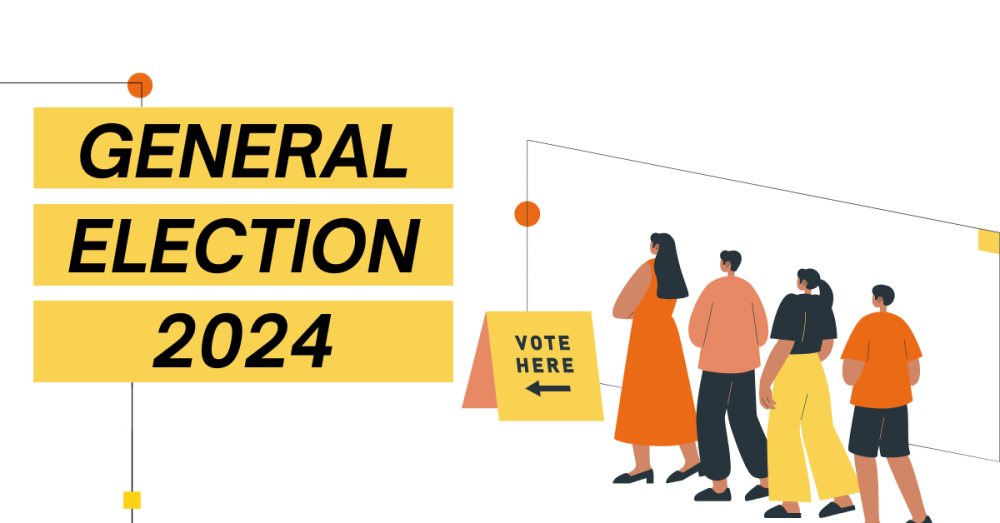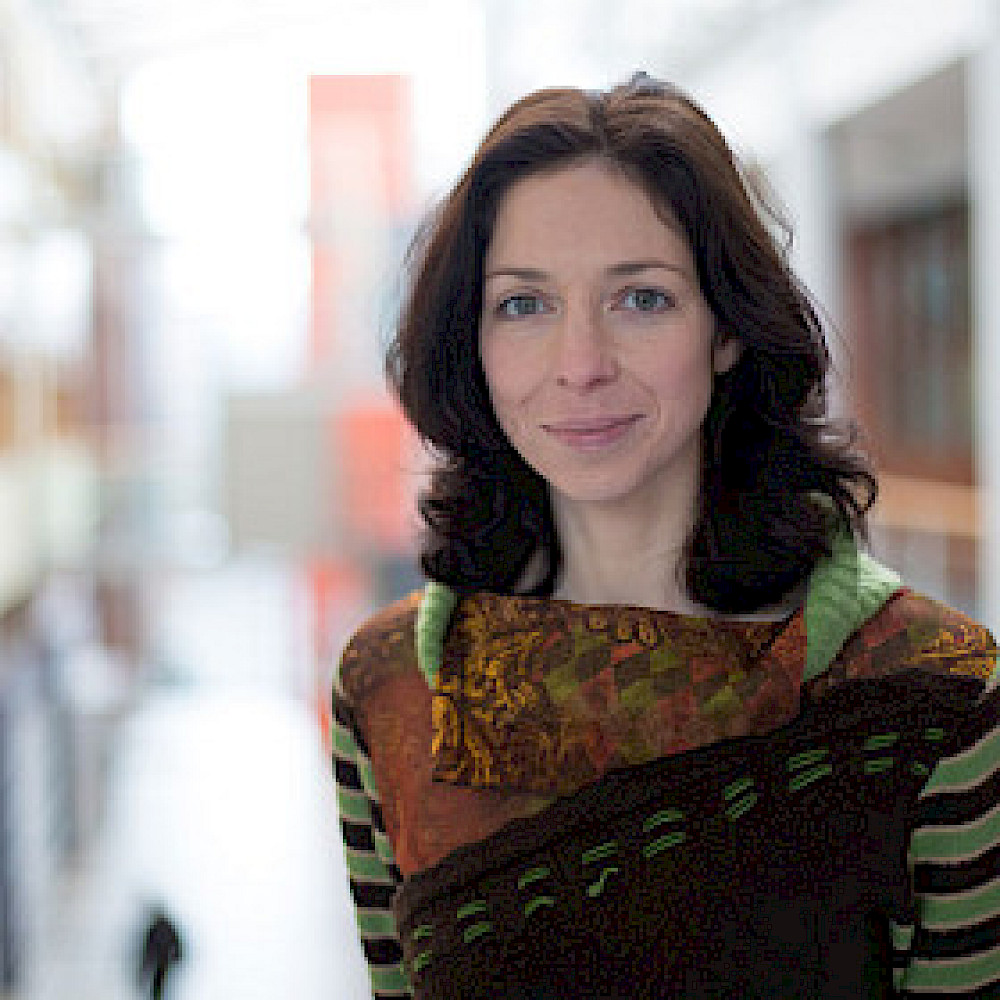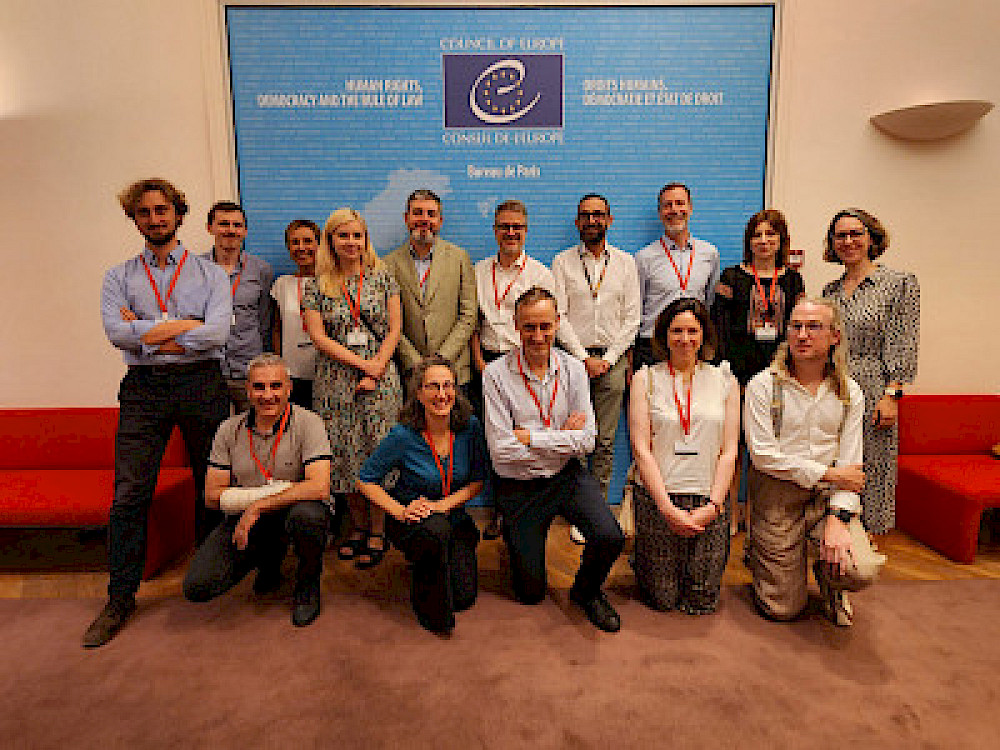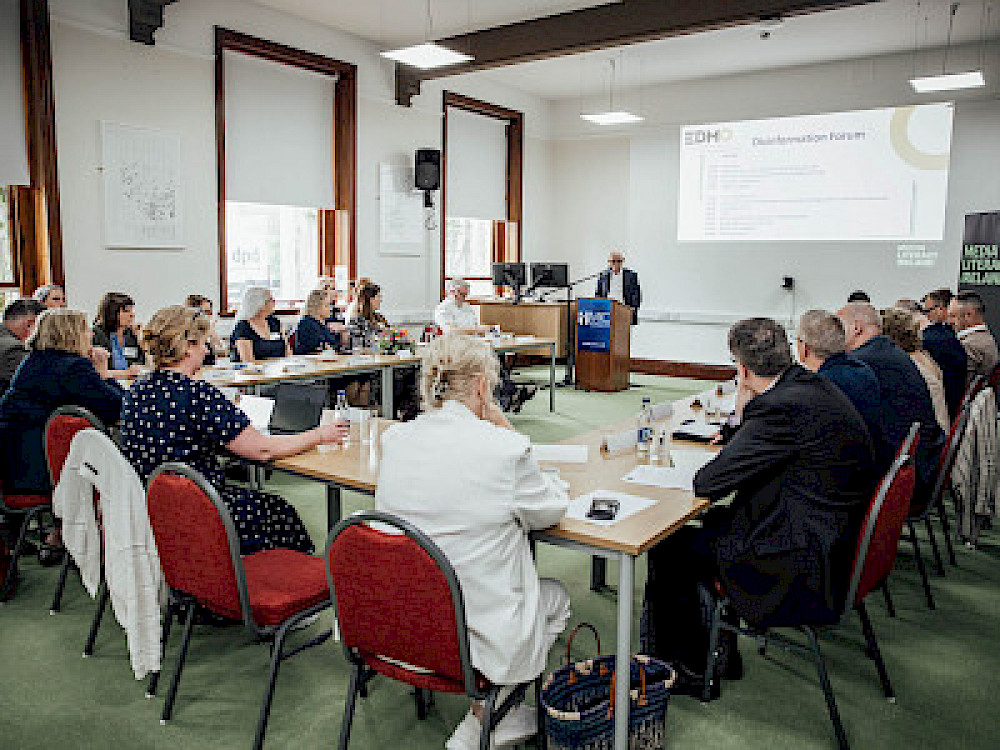GE24 Media Dynamics: doctored images, dodgy claims, and stage management
by Aoife Barry
The first week of campaigning for General Election 2024 is done, with housing and immigration rising to be two of the biggest issues for parties and their candidates across media and social media.
Early on in the week, the two issues coalesced to show how edited clips can be used on social media to push certain agendas. During Monday’s episode of Upfront with Katie Hannon on RTÉ One, several candidates debated the issue of housing. A number of audience members were also invited to speak about their experiences of Ireland’s housing crisis.
In one section, two women – named Shauna and Chloe – spoke about their experiences of being homeless. Shauna shared how she had subsequently been given a place in cooperative housing alongside her children, while Chloe spoke about how she is still living in a homeless hub with her son.
Edited clips of the women’s contributions were shared by Irish far right accounts on X and TikTok following the show. These edits only included Chloe’s story of homelessness, leaving out the context that Shauna had received an offer of housing after living in hotels with her children following a relationship breakdown.
Hermann Kelly, leader of the Irish Freedom Party and the party’s candidate in Co Louth, shared on his X account a TikTok video of the two women on Upfront which had been edited to show just a short section of each woman’s interview.
Kelly also made mention of the video in a separate post on X, sharing in it a screengrab of this tweet from the Irish Freedom Party. The tweet contained photos of Shauna and Chloe, labelled as an ‘African woman’ and ‘Irish woman’, and stated the former (Shauna) was ‘given a house by the State’.
The video was also mentioned by Cllr Gavin Pepper, who is running as an Independent in Dublin North West, as an example of the State giving ‘foreigners’ houses ahead of Irish people.
This article on Factchecking.ie gives more context to claims about international protection seekers and housing in Ireland.
The news site Euronews factchecked claims made by people sharing the video online, saying that the clip is “misleading” and “tries to incite anti-minority sentiments by reversing the two women’s testimonies, so it looks like the woman who was granted housing is not showing compassion for the homeless woman.”
The sharing of this edited clip from Upfront was a clear example of how edited video clips can be used during this general election campaign to attempt to mislead people. It also showed that guests on panel shows could unwittingly have their image or video shared out of context within hours of their appearance. It’s unlikely to be the only example of this occurring during the campaign.
The Journal also looked at claims made during Upfront about the Help to Buy and First Home shared equity schemes, and Ireland’s level of homeownership. That both these claims are not exactly straightforward to debunk highlights how in this campaign factchecking can help parse details that aren’t fully explained on air.
Immigration
Various candidates from the National Party and Ireland First made other claims about immigration and housing online during the week, including claims linked to the great replacement theory.
A video from the National Party’s Dublin South West candidate Yan Mac Oireachtaigh included the claim that Ireland is “facing massive levels of plantation”, while Ireland First’s leader and Cork North Central candidate Derek Blighe shared a post that claimed “illegal migrants are floating into 4 star accommodation”. (See above for factchecking on this issue.)
National Party candidate Stephen Redmond, running in Dublin North West, also claimed in a campaign video that the government is “warehousing people”.
Posters from the National Alliance (a grouping of far-right political parties and independent candidates) were also shared on social media. The posters feature a slogan that links to the great replacement theory: ‘Replace them before they replace you!’. The Journal Factcheck looked at the use of this phrase and its links to the ‘plantation’ slogan this week, as well as the claims of ‘replacement migration policies’ made by Independent Nationalist candidate Cathy Lynch.
Doctored image
This week also saw factchecking of a viral general election-related image. This image showed a sleeping bag that appeared to have a person sleeping on it, a few feet away from a Fine Gael campaign poster featuring Taoiseach Simon Harris.
This image was shared among three X accounts on either 7 or 8 November, according to The Journal Factcheck. These included the official account of People Before Profit, and an account in the name of Sinn Féin TD Mark Ward.
But as The Journal pointed out, the original image – which did not feature a Fine Gael ad – was posted on the site Shutterstock in 2019. The manipulated photograph, where a chocolate bar advertisement in the original photo was replaced by the Fine Gael ad, had been posted by Waterford Whispers News on 7 November 2024.
Waterford Whispers News is a satirical website, which often manipulates images for overtly satirical or comedic ends. This incident highlights that for voters it’s important not to take images shared by any account on social media at face value. It wasn’t clear whether Ward or People Before Profit knew that the image was manipulated. If you’re unsure about the veracity of an image, using a reverse Google image search can help you discover its origin.
Political ads
You might have noticed a stream of advertisements from certain political parties popping up on your social media feeds, but some parties are being more gung-ho about this than others.
As Liz Carolan pointed out on The Briefing, almost a week into campaigning, Sinn Féin had yet to start its own general election digital campaign. She found that Fine Gael (at €63,363) tops the list of Meta ad spends for the first 10 days of November compared to October, followed by Fianna Fáil (€37,560) and Labour (€16,347) with Sinn Féin at €13,148.
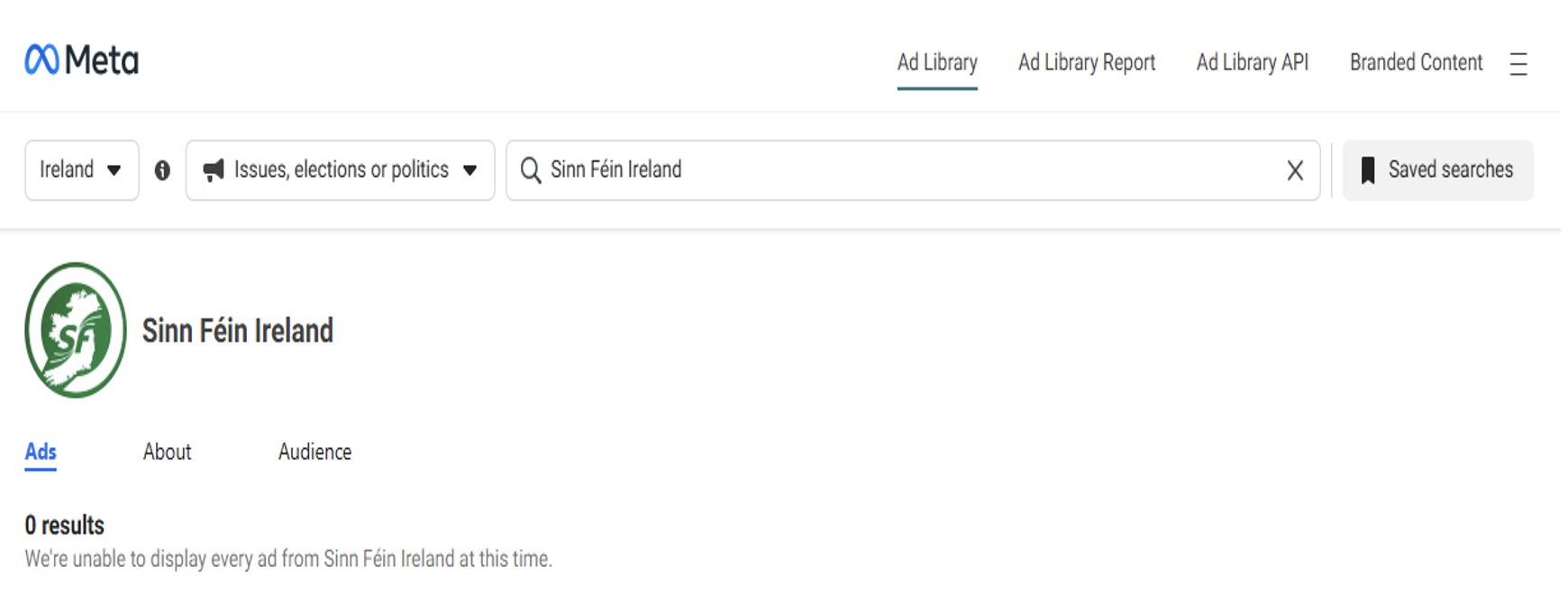
Looking at the biggest spenders, Fine Gael began its week running ads on Meta that featured party leader and Taoiseach Simon Harris introducing the party’s candidates, and by midweek was running ads on Meta and Google focusing on the party’s promises regarding childcare costs. Some even starred children who were given the chance to lightly grill Harris about what he’d do to help out their parents.
Fianna Fáil focused on its policies, particularly around housing, healthcare and crime, in its Meta ads. But it also is running an ad for a ‘supporters draw’, where people who support the campaign financially (by buying a ticket worth €20 or book of tickets for €50) can be in with a chance to win a trip to New York City on St Patrick’s Day.
Labour’s ads were more targeted to specific areas, with candidates raising local issues. In one sponsored Meta ad, Labour candidate Conor Sheehan in Limerick claimed “people in Limerick are terrified of going to their local hospital”.
The Green Party only launched two ads in November, both about its policies on climate action.
Cyber threats
How at risk is Ireland of a cyber threat during this campaign? The National Cyber Security Centre in Ireland has published a report looking at the ‘cyber threat landscape’ for General Election 2024.
Let’s not forget that in June, it was reported that an attempted cyber attack by Russia-based hackers targeted a number of government websites in the days before the local and European elections.
Because of the potential threats by State-aligned actors looking to destabilise and manipulate electoral processes in Western countries, the NCSC recently updated its guidance on cybersecurity for political organisations and candidates.
Two of its findings of note from its latest report were that:
- There is a medium risk of cyber enabled attacks targeting election candidates and political organisations, including ‘hack and leak’ operations
- There is a medium risk of cyberattacks during the election cycle, and while a ‘hacktivist’ event during the voting period is likely, the potential impact is assessed to be low.
The full report can be read here.
Trending topics
According to Newswhip data, housing dominated social media timelines this week, followed by immigration. Tracking social media interactions on articles about these topics we can see in this image (below) how interest rose and fell throughout the week:
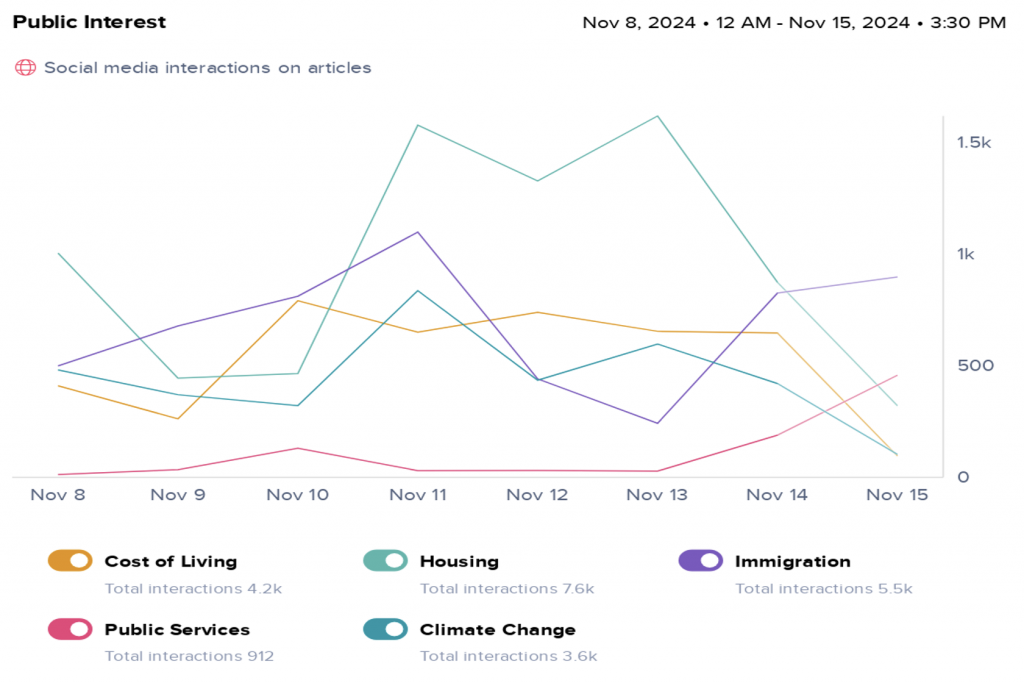
There was a flurry of media articles about housing from Monday, reflecting the fact that the parties began announcing their housing policies. Reaction and analysis continued for days, while comments from former Housing Minister Eoghan Murphy – made as he did the publicity rounds for his political memoir – also contributed to the discussion of this topic online.
Meanwhile, Newswhip data shows social media interactions on articles about immigration grew steadily across the weekend, peaking on Monday 11 November before falling on Wednesday. But steady social commentary on articles posted by Gript in particular – which related to comments by Justice Minister Helen McEntee and, separately, Sinn Féin’s immigration policy – saw interactions almost reach the Monday peak on Friday.
Although COP29 had been ongoing at Baku, social media interactions on articles about climate change never reached the heights of those regarding housing and immigration this week. There was slightly more interaction on articles relating to cost of living, but the trend loosely followed climate change – rising early in the week before dropping again by Friday. For now, it’s clear that housing and immigration are likely to dominate both media coverage and social media reaction as we head into the second week of campaigning, and that voters should continue to be alert for misleading commentary and content on social media
And finally…
Given that this week saw the kicking off of party campaigns, unsurprisingly many of the videos posted by candidates on social media were of them on the campaign trail. We were granted a bit of levity when both Simon Harris and Sinn Féin leader Mary Lou McDonald shared videos of their visits to Sound Quality Gifts in Co Monaghan, where they danced with shop owner Helen Drumm, who is a popular TikTok user.
Harris claimed afterwards that he had been “certified to have rhythm”, though this claim has not yet been factchecked.
(The Group Chat podcast from Virgin Media News gave an interesting insight into some of the stage management on the campaign trail, if you want to know more about that.)
Related Projects

EDMO Ireland is one of fourteen hubs established as part of the European Digital Media Observatory (EDMO). Coordinated by Dr Eileen Culloty from Dublin City University (DCU), the EDMO Ireland consortium includes the DCU Institute for Future Media, Democracy and Society (FuJo), TheJournal FactCheck, NewsWhip, and the University of Sheffield. It is part-financed by the European Union to monitor and analyse disinformation; conduct factchecks and investigations; develop media literacy resources; as...
